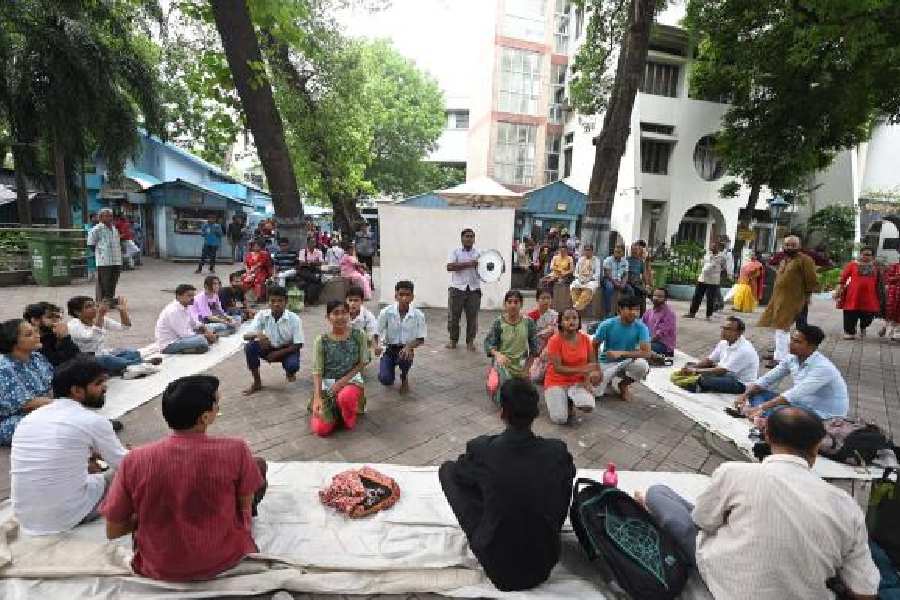A school that came up during the Covid-forced lockdown in 2020 to enable children of unorganised workers to be in touch with their books has continued to have a life of its own.
Not only that; some of the children of the school, Rokeya Shiksha Kendra, have formed a cultural troupe that is now sought after in the city.
On Sunday afternoon, these children performed Hottomalar Opare, a play by Badal Sircar, inside the Nandan compound. The production was devoid of a formal stage, fancy props and sound and light equipment, in keeping with the philosophy of the Third Theatre movement championed by Sircar.
A slice of the open area in the northwestern part of the compound, near the Amantran canteen, turned into a performance space with a white cloth in the background and viewers on three sides.
A cluster of groups that has been organising campaigns for severalyears to popularise the Third Theatre movement invited the childrenof Rokeya.
The play is about two thieves who jump into a river in a bid to escape and land up on the shores of a land where money and material possessions have no value, where buying and selling are alien ideas.
The production was minimalist but the applause that followed the performance was loud. After the performance, the actors went around the audience with a gamchha. Many viewers gave them money.
Sunday’s performance was the fifth production of Hottomalar Opare by Rokeya Rangmashal, the name of the theatre group.
One of the previous performances took place in the community zone under the flyover in front of Axis Mall in New Town, during a street theatre festival organised by Sister Nivedita University. The group also performed at an auditorium at the Indian Statistical Institute on the invitation of a cultural platform of students and teachers of the Baranagar institute.
The actors come from marginalised families. Most of them live in slums and colonies in and around Patuli and Garia off EM Bypass. None of their families has any theatre background. Their tryst with theatre started after their enrolment in the school, billed as a volunteer-driven, community-learning centre and named after Rokeya Sakhawat Hossain (1880-1932), Bengal’s pioneering Muslim feminist writer, educationist and activist.
The school has over 130 students, who are enrolled in government schools. But most of their learning happens in Rokeya.
Besides formal classrooms, film screenings, book reading sessions and theatre are integral parts of their learning.
“Theatre has helped many of the children in opening up. It is now an important medium of expression for them,” said Kasturi Basu, a filmmaker-activist who is one of the founders of the school.
“Besides that, theatre helps in bonding and building a team spirit. That spirit is central to whatever we do at Rokeya. Theatre also teaches responsibility. From costume to posters, the children take care of everything,” she said.
Sabyasachi Banerjee, a theatre worker and founder of a troupe called Dilkhush, has been training the children of Rokeya for over a year now. He holds regular workshops with the students.
“The children have started taking a keen interest in theatre. That is the most important thing. Their involvement in theatre aligns with Badal Sircar’s philosophy. Sircar wanted to take theatre to the masses,” said Banerjee.
Sircar’s Third Theatre movement challenged the conventional norms of a proscenium theatre.
In Third Theatre, a conventional stage is replaced by an anganmancha, a space shared uniformly by the audience and actor, unlike proscenium theatre guarded by curtains and keeping the audience at a distance.
“The production becomes inexpensive, flexible and portable and helps in reaching out to a wider audience,” said Banerjee.
Pratyay Mukherjee, a visiting faculty at ISI and one of the founders of Muktangan, which had invited Rokeya Rangmashal to stage the play, said: “Rokeya’s work in imparting holistic education is significant. Bengal is billed as the land of culture. But culture, per say, seems to be the domain of barely 10 per cent of the society. Rokeya is changing that and we support the effort.”
